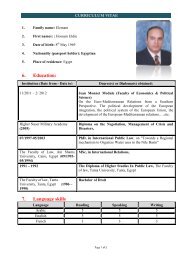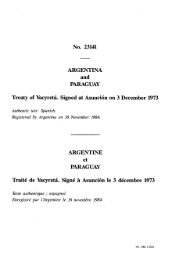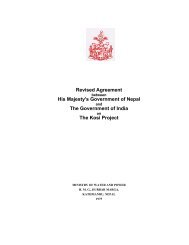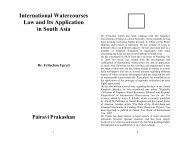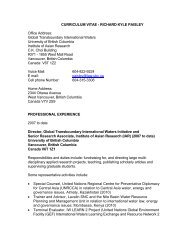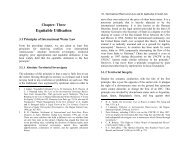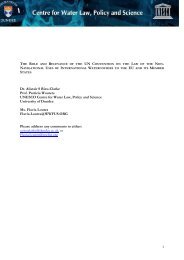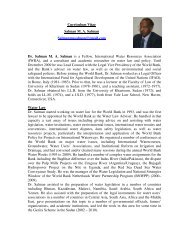Upreti, Trilochan, International Watercourses Law and Its Application ...
Upreti, Trilochan, International Watercourses Law and Its Application ...
Upreti, Trilochan, International Watercourses Law and Its Application ...
You also want an ePaper? Increase the reach of your titles
YUMPU automatically turns print PDFs into web optimized ePapers that Google loves.
198 / <strong>International</strong> <strong>Watercourses</strong> <strong>Law</strong> <strong>and</strong> <strong>Its</strong> <strong>Application</strong> in South Asia Prospects <strong>and</strong> Problems of Nepalese Water Resources / 199However, it can be concluded that the water resources of Nepal,which are of bountiful proportions <strong>and</strong> have great potential, ifdeveloped in a holistic, integrated way, with a regionalperspective, could lead to the entire region, including Nepal,becoming as Kuwait is to the Middle East, with water being, asit were, the oil. This notion is widely believed in the region.The other point is that if the former treaties, as described above,do not address Nepal’s interests, or are not being implementedas per the treaty provisions, they should be renegotiated fortheir better implementation, or otherwise abrogated. If they areagainst the principles of the UNCIW <strong>and</strong> Article 64 of theVienna Convention on the <strong>Law</strong> of Treaties 1969, such treatiescan be abrogated or may be declared to have automaticallycome to an end. 53 There are several examples of this kind ofabrogation, renegotiation <strong>and</strong> conclusion of new treaties in theinternational arena as well as in interstate practice. Forexample, the Indian state of Punjab’s Legislative Assemblyrepudiated a 1981 agreement with Haryana on April 23 1982,stating that it did not safeguard its interests; as a result theRavi-Beas Waters Tribunal (Erdi Tribunal) was constituted bythe Indian federal government. 54 In another state, the Jammu<strong>and</strong> Kashmir Legislative Assembly also asked the Indiangovernment to abrogate the 1960 Indus Treaty because it didnot protect its interests properly <strong>and</strong> fairly. However, thisrequest was denied by the latter. 55 In the USA, the state ofArizona did not ratify the Colorado River Compact which ithad negotiated <strong>and</strong> to which it had agreed to be a party; the casewas later decided by the US Supreme Court, invoking theequitable apportionment principle. 56In the international arena, the Nile treaty of 1929 was annulledby Sudan <strong>and</strong> a new treaty was concluded in 1959. 57 However,Hungarian termination of a 1977 treaty with Czechoslovakiapertaining to the sharing of benefits from the Danube riverwaters was declared illegal by the ICJ. 58 Similarly, Pakistan hasunilaterally repudiated the May 4, 1948 agreement with India,regarding the payment of compensation for obtaining acontinued flow of waters from the former, stating that thisagreement was concluded under such compulsion that it couldnot refused. 59 From the viewpoint of international law, it isdemonstrated above that if an agreement is not serving theinterest of one party, due to changed circumstances or in othersimilar situations there is a way out, enabling the negotiationfor a new agreement or the revising of an existing one.Furthermore, from the viewpoint of Convention on the <strong>Law</strong> ofthe Treaties every state has a right to protect <strong>and</strong> preserve itsown interest; for example if a treaty is not beneficial, it can beexchanged for a new one. 60 But it should be understood thatwithout bilateral agreement, replacement, amendment <strong>and</strong>change of a treaty is not possible. Any arrangement can be donein bilateral consent <strong>and</strong> agreement except in uniquecircumstance for example, the impossibility of performance ofthe treaty or the occurrence of a fundamental change ofcircumstances or the material breach of the treaty etc. However,53 8 ILM (1969), p. 679; also see M. Patker, “Review all Unequal Indo-Nepal Water Treaties” in the Kathm<strong>and</strong>u Post, 11 December 2002: Aargument to renegotiate all treaties between Nepal <strong>and</strong> India.54 B. R. Chauhan, Settlement of <strong>International</strong> <strong>and</strong> Inter State WaterDisputes in India, Bombay: N. M. Tripathi Ltd., 1992, p. 284.55 M. Paukert, “The Indus Umbilical” in Himal South Asian, July (2002),pp. 1-4.56 F. J. Trelease, “Arizona Versus California: Allocation of WaterResources to People, States <strong>and</strong> Nations” in P. B. Kurl<strong>and</strong> (ed),Supreme Court Review, Chicago: 1963, pp. 158-205.57 II YBILC (1974), p. 65.58 37 ILM (1998), pp. 162-202.59 R. K. Baxter, “The Indus Basin” in A. Garretson, et al (eds), The <strong>Law</strong>of <strong>International</strong> Drainage Basins, New York: Oceana Pub., 1967, pp.456-457; also see L. Caflisch, “Unequal Treaties” (1992) in 35 GYBIL,pp. 520-80.60 Articles 39, & 54 of the Vienna Convention on the <strong>Law</strong> of Treaties, 8ILM (1969), pp.694 & 699.



